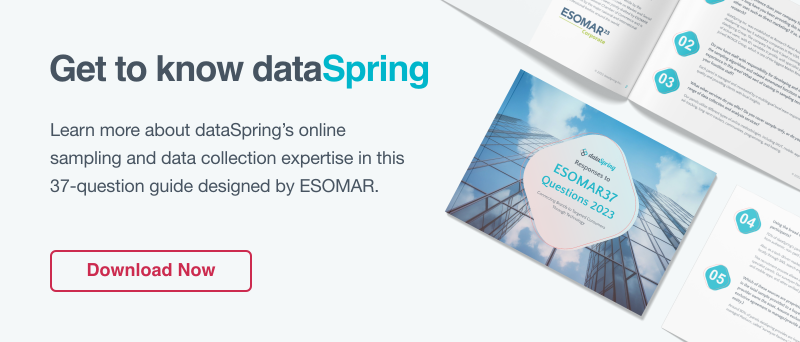
With increased visibility Korea has received from the successful hosting of the Winter Olympics, along with growing exports and higher domestic consumption, many firms have an interest in entering the market. It is critical that researchers and consultants tasked with supporting marketing and product launches know the effective market research trends in Korea.
Saehee Kim, General Manager, and Geunjin Kim, Team Manager for dataSpring in Korea provide their perspective on the approaches and methodologies that drive market research in Korea.
|
Saehee Kim, General Manager |
Geunjin Kim, Team Manager |
What types of studies are most common now in Korea?
From a marketing perspective, product research is very common in Korea, however, there is also a good amount of public opinion polling that occurs. These methods are driven a lot by consumer products, specifically the beverage, grocery, and children's food and goods. These categories, in particular, are popular as the food and beverage market in Korea is changing in line with more heightened interest in health and reduction in food additives.
Home appliances and automobile manufacturers are also large market research consumers as they are core industries in Korea. These industries dominate both the domestic-to-domestic research market, but also the domestic-to-global market.
Any other industries that are growing market research users?
Beauty is a huge market in Korea. AmorePacific is the number one cosmetic company here and is also very popular throughout Southeast Asia. Another 'industry' that the Korean government promotes is K-Pop! The Ministry of Culture has a dedicated K-Pop team.

What research methodologies are most used?
Face-to-face research is still popular - ESOMAR estimates about 25% of research are F2F - but the market is changing rapidly. Internet access is very high in Korean households and is well represented in all demographics. For this reason, some companies are conducting online research as a way to get the most bang for their buck.
What is holding back companies from conducting more online research in Korea?
Some are due to the industry itself not being comfortable recommending online methods. There is a comfort in repeating tried and true methods like phone and face-to-face, but the reality is that consumers are busier than ever, and market research firms need to adapt to this.
It does take some effort to adapt to online. Simply programming an offline survey may result in a poor study, but we think that as more firms understand the benefits of online there will be even more of a shift to this methodology.
What about Mobile/Smartphone data collection?
Mobile research is also growing in popularity but hasn't yet gone 'mainstream' because the traditional types of studies - tracking, product concept, positioning - contain lots of questions and intense attribute matrices, which don't translate well to mobile. For those clients interested in mobile methods we are helping them understand the best practices for questionnaire design in mobile.
We believe a lot of growth in mobile will be in more qualitative methods, like mobile ethnographies. Our mobile survey app allows researchers to reach target consumers on-the-go and in-the-moment. With the capabilities of image capture and video, we can provide real depth and context to understanding a consumer's attitudes and purchase behavior.
What do you think is most important to consider when conducting research in Korea?
I think it is key that researchers look to understand the local cultural differences. We often get questionnaires that are a part of global or pan-Asian studies that are not really suitable for the Korean market. This can be simple things like translation problems, but also more subtle issues that don't comprehend local attitudes or shopping behavior. It is crucial to use a local resource that understands the nuances of a market and can help properly localize the study.
Great. Thank you for your time and your insights, Saehee and Geunjin.
No problem, our pleasure. ^_^




 Download Panel Book
Download Panel Book


